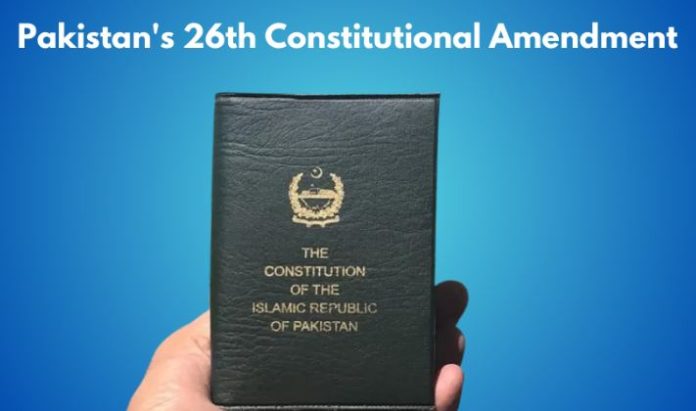ISLAMABAD, OCT 20: Federal Law Mnister Azam Nazir Tarar on Sunday introduced the long-awaited 26th Constitutional Amendment Bill 2024 in the Senate. The bill includes several key changes aimed at enhancing various aspects of governance and legal frameworks in Pakistan.
Below are the salient features of the bill:
Right to clean and healthy environment:
A new Article 9A is inserted, granting every citizen the right to a clean, healthy, and sustainable environment.
Elimination of riba (Interest):
Amendment to Article 38 (f) mandates the complete elimination of riba (interest) by January 1, 2028.
Judicial Independence and Protection:
Amendment to Article 48(4) clarifies that the advice given to the President by the Cabinet or Prime Minister cannot be challenged in any court or tribunal
Amendment to Article 81 includes provisions for the allocation of funds for judicial bodies such as the Judicial Commission of Pakistan and Supreme Judicial Council
Watch exclusive coverage
Article 175A has been revised to provide a performance evaluation system for judges of the High Courts. The evaluation process will ensure accountability and address inefficiencies
Revisions to Article 177 specify that a person must have served as a High Court Judge for at least five years or practiced for 15 years in the High Court and the Supreme Court to qualify as a Judge of the Supreme Court
Revised procedure for appointment of judges:
Article 175A has been further modified to change the composition of the Judicial Commission responsible for appointing Supreme Court judges. A Special Parliamentary Committee will appoint the Chief Justice of Pakistan from among the three most senior judges
The committee will include representatives from the National Assembly and Senate, ensuring proportional representation of political parties based on their parliamentary strength
The committee will operate with a majority vote (two-thirds) to finalize judicial appointments
Organising elections:
Amendment to Article 81 includes provisions for sums to organize and conduct elections for the National Assembly, Senate, Provincial Assemblies, and local governments
Judicial evaluation and accountability:
Provisions are added for annual performance evaluations of High Court Judges by the Judicial Commission.
In cases of unsatisfactory performance, judges will be given a chance to improve, failing which the matter will be referred to the Supreme Judicial Council
Retirement age and tenure of Chief Justice of Pakistan:
Amendment to Article 179 limits the tenure of the Chief Justice of Pakistan to three years, irrespective of age. After the completion of their term, the Chief Justice will retire regardless of their age at the time
Appointment criteria for SC:
Changes to Article 177 redefine the qualifications required for appointments to the Supreme Court, requiring candidates to have served as High Court judges for at least five years or to have practised as advocates for at least 15 years

















